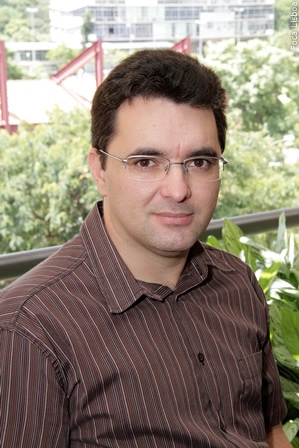Eduardo Figueiredo

Bolsa de Produtividade CNPq: B
Áreas de Pesquisa: Formação Acadêmica:
Doutor, Lancaster University, Inglaterra, 2009
Ramal: 5878
figueiredo@dcc.ufmg.br
 Página pessoal
Página pessoal
 Google scholar
Google scholar
Informações resumidas do Currículo Lattes
Currículo Lattes atualizado em 03/09/2023Nome em citações bibliográficas: FIGUEIREDO, Eduardo;Figueiredo, E.;Figueiredo, Eduardo;FIGUEIREDO, EDUARDO MAGNO LAGES
Projetos de pesquisa em andamento
| 2023 a Atual | Avaliação Experimental da Qualidade Interna de Sistemas de Software IoT Apoiados por Inteligência Artificial [FAPEMIG] Este projeto visa propor uma avaliação experimental da qualidade interna de sistemas de software IoT apoiados por Inteligência Artificial (IA), doravante chamados de sistemas IoT+IA. Esta avaliação experimental visa apoiar o entendimento de aspectos cruciais ao controle da qualidade interna de sistemas IoT+IA. Integrantes: Eduardo Magno Lages Figueiredo (coordenador), Eduardo Figueiredo, Kattiana Constantino, Eduardo Fernandes. |
| 2022 a Atual | SensitivePitfalls: Static and Dynamic Analyses of Sensor-aware Code Pitfalls in Highly Configurable and Adaptive Systems (CNPq PQ) A configurable and adaptive software system is able be changed, customized, or adapted for a particular context. The growing need for developing highly configurable and adaptive software systems demands better support for managing complexity related to sensor devices, such as location (GPS), proximity, and camera. Sensors enable the generation of configurable and adaptive software systems, but they also create new challenges in software development, maintenance, and testing tasks. This project aims to investigate the challenges related to sensor interaction in configurable and adaptive software systems. In particular, we plan to focus our research on static and dynamic analyses of source code in configurable and adaptive systems in the presence of sensor interaction. Integrantes: Eduardo Magno Lages Figueiredo (coordenador), Eduardo Figueiredo, Fischer Ferreira, Jabier Martinez, Christian Kastner. |
| 2017 a Atual | Anomalias de Software Sensíveis à Variabilidade em Linha de Produtos de Software (FAPEMIG PPM) Este projeto visa aplicar técnicas de análise estática para identificar fragmentos de código complexos na implementação de variabilidade. Tais fragmentos complexos são chamados anomalias de software sensíveis à variabilidade. Além de técnicas de análise estática de código, é planejada a realização de entrevistas com desenvolvedores de software para o entendimento do impacto de anomalias de software sensíveis à variabilidade em linha de produtos de software. Com base nos dados coletados, este projeto objetiva propor e avaliar um novo método para detecção de anomalias de software sensíveis à variabilidade. Uma ferramenta de software deve ser desenvolvida para apoiar os passos do método em uma detecção automatizada de tais anomalias. O objetivo final é apoiar desenvolvedores na detecção e remoção de anomalias de software sensíveis à variabilidade em linha de produtos de software. Integrantes: Eduardo Magno Lages Figueiredo (coordenador), Eduardo Figueiredo. |
Projetos de desenvolvimento em andamento
Últimas publicações
Artigos em periódicos
On the Usage of New JavaScript Features through Transpilers: The Babel Case2023. IEEE SOFTWARE.
Dual analysis for helping developers to find collaborators based on co-changed files: An empirical study
2023. SOFTWARE: PRACTICE AND EXPERIENCE.
Evaluating testing strategies for resource related failures in mobile applications
2023. SOFTWARE QUALITY JOURNAL (ONLINE).
Open-source software product line extraction processes: the ArgoUML-SPL and Phaser cases
2022. EMPIRICAL SOFTWARE ENGINEERING.
JavaScript API Deprecation Landscape: A Survey and Mining Study
2022. IEEE SOFTWARE.
Mining Experts from Source Code Analysis: An Empirical Evaluation
2021. JOURNAL OF SOFTWARE ENGINEERING RESEARCH AND DEVELOPMENT.
Evaluating T-wise testing strategies in a community-wide dataset of configurable software systems
2021. JOURNAL OF SYSTEMS AND SOFTWARE.
Perceptions of open-source software developers on collaborations: An interview and survey study
2021. J SOFTW-EVOL PROC.
Challenges of Resolving Merge Conflicts: A Mining and Survey Study
2021. IEEE TRANSACTIONS ON SOFTWARE ENGINEERING.
Understanding machine learning software defect predictions
2020. Automated Software Engineering.
 Applying and Evaluating Concern-Sensitive Design Heuristics
Applying and Evaluating Concern-Sensitive Design Heuristics2012. The Journal of Systems and Software.
Trabalhos completos em congressos
Yet Another Model! A Study on Model's Similarities for Defect and Code Smells2023. International Conference on Fundamental Approaches to Software Engineering (FASE 2023).
Artifacts of Yet Another Model! A Study on Model's Similarities for Defect and Code Smells
2023. 26th International Conference on Fundamental Approaches to Software Engineering (FASE).
Recommending Collaborators Based on Co-Changed Files: A Controlled Experiment
2023. Simpósio Brasileiro de Sistemas Colaborativos.
Are the Mutations of Strongly Subsuming Second-Order Mutants Actually Masking Each Other?
2023. 34th IEEE International Symposium on Software Reliability Engineering (ISSRE).
Behind Developer Contributions on Conflicting Merge Scenarios
2023. 23rd IEEE International Working Conference on Source Code Analysis and Manipulation (SCAM).
Applying Spectrum-Based Fault Localization to Android Applications
2023. Brazilian Symposium on Software Engineering Software (SBES).
Finding Collaborations based on Co-Changed Files
2023. Master and PhD Contest on Collaborative Systems (CTDSC).
Exploring API Deprecation Evolution in JavaScript
2022. 2022 IEEE International Conference on Software Analysis, Evolution and Reengineering (SANER).
The Subtle Art of Digging for Defects: Analyzing Features for Defect Prediction in Java Projects
2022. International Conference on Evaluation of Novel Approaches to Software Engineering (ENASE).
CoopFinder: Finding Collaborators Based on Co-Changed Files
2022. IEEE Symposium on Visual Languages and Human-Centric Computing (VL/HCC).
Microservice Smells and Automated Detection Tools: A Systematic Literature Review
2022. International Conference on Microservices (Microservices).
Can Source Code Analysis Indicate Programming Skills? A Survey with Developers
2022. 15th International Conference on the Quality of Information and Communications Technology (QUATIC).
Understanding Thresholds of Software Features for Defect Prediction
2022. Brazilian Symposium on Software Engineering (SBES).
EXTRACTPRO: A Data Mining Tool for Developer Profile Generation based on Source Code Analysis
2022. Brazilian Symposium on Software Engineering (SBES).
Democracia em Xeque: Um Estudo Comparativo sobre Detecção de Code Smells
2022. 10th Workshop on Software Visualization, Evolution and Maintenance (VEM).
Review-based Comparison of Design Pattern Detection Tools
2022. International Conference on Pattern Languages of Programs (PLOP).
A systematic review on the use of DevOps in internet of things software systems
2021. SAC '21: The 36th ACM/SIGAPP Symposium on Applied Computing.
An exploratory study on the identification and evaluation of bad smell agglomerations
2021. SAC '21: The 36th ACM/SIGAPP Symposium on Applied Computing.
Dissecting Strongly Subsuming Second-Order Mutants
2021. 2021 14th IEEE Conference on Software Testing, Verification and Validation (ICST).
Understanding the Context of IoT Software Systems in DevOps
2021. 3rd International Workshop on Software Engineering Research and Practices for the Internet of Things (SERP4IoT).
Evaluating Sensor Interaction Failures in Mobile Applications
2021. International Conference on the Quality of Information and Communications Technology (QUATIC).
On the Challenges for Creating a Test Suite for Configurable Software Systems
2021. 24th Iberoamerican Conference on Software Engineering (CIbSE).
Main Differences of DevOps on IoT Systems
2021. SBES '21: Brazilian Symposium on Software Engineering.
Investigating Continuous Delivery on IoT Systems
2021. SBQS '21: XX Brazilian Symposium on Software Quality.
Microservices Bad Smells and Automated Detection Tools
2021. Master and PhD Workshop on Software Quality (WTDQS).
On the proposal and evaluation of a test-enriched dataset for configurable systems
2020. VaMoS '20: 14th International Working Conference on Variability Modelling of SoftwareIntensive Systems.
JavaScript API Deprecation in the Wild: A First Assessment
2020. 2020 IEEE 27th International Conference on Software Analysis, Evolution and Reengineering (SANER).
How Difficult and Effective is Writing Assertions for Observing Bugs at Runtime?
2020. In proceedings of the 23rd Iberoamerican Conference on Software Engineering (CIbSE).
Revisiting the Bad Smell and Refactoring Relationship: A Systematic Literature Review
2020. In proceedings of the 23rd Iberoamerican Conference on Software Engineering (CIbSE).
Commit Classification using Natural Language Processing: Experiments over Labeled Datasets
2020. In proceedings of the 23rd Iberoamerican Conference on Software Engineering (CIbSE).
Testing configurable software systems
2020. SPLC '20: 24th ACM International Systems and Software Product Line Conference.
Understanding collaborative software development
2020. ICGSE '20: 15th IEEE/ACM International Conference on Global Software Engineering.
Detecting bad smells with machine learning algorithms
2020. TechDebt '20: International Conference on Technical Debt.
A Test Strategy for Configurable Software Systems Using Machine Learning
2020. 23rd Iberoamerican Conference on Software Engineering (CIbSE).
 Efficiently finding higher-order mutants
Efficiently finding higher-order mutants2020. ESEC/FSE '20: 28th ACM Joint European Software Engineering Conference and Symposium on the Foundations of Software Engineering.
Analyzing the Impact of Refactoring on Bad Smells
2020. SBES '20: 34th Brazilian Symposium on Software Engineering.
JExpert
2020. SBES '20: 34th Brazilian Symposium on Software Engineering.
PLATOOL
2020. SBES '20: 34th Brazilian Symposium on Software Engineering.
Quantifying the Effects of Refactorings on Bad Smells
2020. Master and PhD Workshop on Software Engineering (WTDSoft).
Assessing JavaScript API Deprecation
2020. Master and PhD Workshop on Software Engineering (WTDSoft).
Failure of One, Fall of Many: An Exploratory Study of Software Features for Defect Prediction
2020. 2020 IEEE 20th International Working Conference on Source Code Analysis and Manipulation (SCAM).
GitHub Label Embeddings
2020. 2020 IEEE 20th International Working Conference on Source Code Analysis and Manipulation (SCAM).
Insights on software product line extraction processes
2020. SPLC '20: 24th ACM International Systems and Software Product Line Conference.
Predicting Software Defects with Explainable Machine Learning
2020. Brazilian Symposium on Software Quality (SBQS).
 Crosscutting Patterns and Design Stability: An Exploratory Analysis
Crosscutting Patterns and Design Stability: An Exploratory Analysis2009. International Conference on Program Comprehension (ICPC).
 Evolving Software Product Lines with Aspects: An Empirical Study on Design Stability
Evolving Software Product Lines with Aspects: An Empirical Study on Design Stability2008. International Conference on Software Engineering (ICSE).
Resumos expandidos em congressos
Resumos em congressos
Evaluación de la Usabilidad en el desarrollo de Sistemas Web dirigido por modelos2011. XIII Workshop de Investigadores en Ciencias de la Computación (WICC).
Aspectos @ PUC
2004. I Workshop Brasileiro de Desenvolvimento de Software Orientado a Aspectos (WASP).
Integração de Uma Ferramenta de Refabricação de Software a um Ambiente de Desenvolvimento de Sistemas
2003. Seminário de Iniciação Científica da Ufop.
Veja todas as publicações no Currículo Lattes
Orientações em andamento
Mestrado
Jefferson Geovane Moreira Lopes. Analyzing the Impact of Developer Expertise on Code Quality. Início: 2023. Universidade Federal de Minas Gerais (Orientador principal)Guilherme Valdir Marchiori da Silva. Software Engineering Education. Início: 2023. Universidade Federal de Minas Gerais (Orientador principal)
Altino Alves Junior. Self-Admitted Technical Debt. Início: 2023. Universidade Federal de Minas Gerais (Orientador principal)
Felipe dos Santos Leao Ribeiro. Bad Smells in JavaScript Systems. Início: 2022. Universidade Federal de Minas Gerais (Orientador principal)
Doutorado
Henrique Gomes Nunes. Detecting Code Smells with Machine Learning Algorithms. Início: 2021. Universidade Federal de Minas Gerais (Orientador principal)Igor Muzetti Pereira. Internet of Things in Software Engineering. Início: 2020. Universidade Federal de Ouro Preto (Co orientador)
Euler Horta Marinho. Tests for Mobile Applications. Início: 2020. Universidade Federal de Minas Gerais (Orientador principal)
Amanda Damasceno Santana. Investigating Bad Smell Agglomerations. Início: 2020. Universidade Federal de Minas Gerais (Orientador principal)
João Paulo de Freitas Diniz. Mutation Testing Cost Reduction. Início: 2018. Universidade Federal de Minas Gerais (Orientador principal)
Veja todas as orientações no Currículo Lattes
